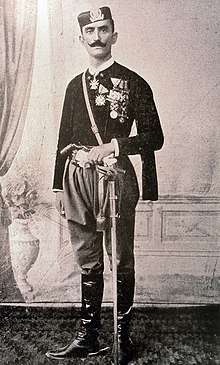Aleksandar Lekso Saičić
Aleksandar Lekso Saičić (Montenegrin Cyrillic Александар Лексо Саичић; Vinicka, August 5, 1873 - Cetinje, April 7, 1911) was a Montenegrin national hero, the captain of the Montenegrin army, and he was remembered for the incredible ability to handle the sabers and after a duel with the Japanese champion, from whom he emerged as the winner.[1]
Aleksandar Saičić | |
|---|---|
| Nickname(s) | Lekso |
| Born | 5 August 1873 Vinicka, Principality of Montenegro |
| Died | 7 April 1911 (aged 37) Cetinje, Kingdom of Montenegro |
| Rank | Lieutenant |
Biography
He finished elementary school and enrolled at the Gymnasium in Cetinje as a pit of Prince Nikola. He graduated from high school in Dubrovnik from where he moved to Belgrade where he attended the Military School. After a non-commissioned school, he has been in Montenegro for three years, where he has been appointed as the aide of the Vasojević Brigade. As a soldier with a desire for further training he goes to Istanbul where he enters the Turkish army as a lieutenant of the Imperial Guard where he serves for three years.[2]

He participated in the Russian-Japanese War. The Montenegrin detachment in that war was led by Jovan Lipovac. Lekso was remembered for killing a Japanese warrior in a duel before the battle in 1905. Because of this victory, he was decorated with Russian Orden. He received congratulations on the winning duel from the Admiral of the Russian Fleet Zinovy Rozhestvensky and Admiral of the Japanese fleet of Tōgō Heihachirō. The Russian government ordered him forty Napoleons in gold annually for the rest of his life. In Manchuria he was promoted to the rank of captain and until the end of the war commanded the cavalry of the Dragon regiment. The saber, which Lekso won the duel with, is preserved today at the Military Museum in Moscow.[4]
He carried the following medals: St. Anne and St. Stanislaw of II class with swords, St. Vladimir of III class with Swords, St. Anne and St. Stanislaw III Class with Swords, Russian Medal of Wounded in Wars, Medal of the Italian Crown of IV class.
Montenegrin medals he received were Medal of Danilo First of IV class and Silver Medal for Bravery.
In battles he was wounded three times, he never took a break to heal the wounds, but he continued to fighting. He died as a result of a jump from the second floor of the King's Palace in Cetinje during the fire while he was trying to save the rare books that were kept there. He was buried with highest military honors.[5][6][7]
References
- "Crnogorac Aleksandar Lekso Saičić posjekao 1905. u dvoboju japanskog samuraja". Montenegrina.net. March 5, 2019. Archived from the original on 28 January 2010. Retrieved 3 March 2019.
- "Promovisana knjiga Aleksandar Lekso Saičić". Mladiniksica.me. March 3, 2019. Retrieved 3 March 2019.
- "The one who defeated samurai". SlavicAffairs.com. December 7, 2018. Retrieved 7 December 2018.
- "Montenegrin Lieutenant Against the Samurai". Slavorum.org. March 3, 2015. Retrieved 3 March 2015.
- "Legendary Montenegrin Warrior Who Defeated a Samurai in a Sword Duel". MeetTheSlavs.com. October 3, 2014. Retrieved 3 October 2014.
- "DRAGULJI ISTORIJE: Kako je Crnogorac Lekso Saičić u dvoboju pośekao samuraja". PortalAnalitika.me. April 7, 2016. Retrieved 7 April 2016.
- https://www.youtube.com/watch?v=tFTPfPCx3xs. Missing or empty
|title=(help)